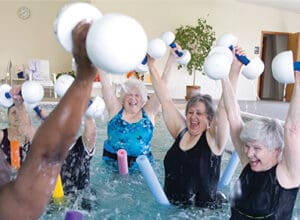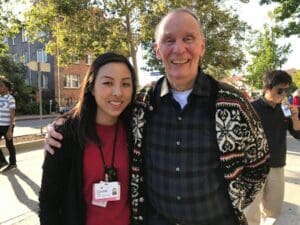
Understanding Memory Care: What is it and Why is it Important?
Memory care is a specialized form of long-term care designed to meet the unique needs of individuals living with Alzheimer’s disease or other forms of dementia. These specialized communities provide a safe, secure, and structured environment that supports residents’ cognitive, physical, and emotional well-being.
Memory care communities in Pasadena, CA, offer services and amenities tailored to the specific needs of those with memory impairments. From personalized care plans and specialized activities to secure environments and around-the-clock support, memory care communities aim to enhance the quality of life for residents and provide much-needed respite for their caregivers.
Signs and Symptoms of Alzheimer’s Disease
Alzheimer’s disease is a progressive neurological disorder that affects memory, thinking, and behavior. As the disease advances, individuals may experience various symptoms that can significantly impact their daily lives. Some of the most common signs and symptoms of Alzheimer’s include:
- Memory loss: Difficulty remembering recent events, names, or familiar information.
- Cognitive decline: Challenges with problem-solving, decision-making, and language skills.
- Personality changes: Shifts in mood, increased anxiety, or withdrawal from social activities.
- Difficulty with daily tasks: Struggles with completing routine tasks, such as cooking, cleaning, or managing finances.
- Disorientation: Getting lost in familiar environments or confusion about time and place.
If you or a loved one are experiencing these symptoms, it is essential to seek medical attention from a healthcare professional for a proper diagnosis and to explore appropriate care options, including memory care in Pasadena.
Getting an Alzheimer’s Diagnosis: What to Expect
Receiving an Alzheimer’s diagnosis can be a challenging and emotional experience, but it is the first step in accessing the support and resources necessary to manage the disease effectively. The diagnostic process typically involves the following steps:
- Initial assessment: Your healthcare provider will conduct a comprehensive medical evaluation, including a physical exam, cognitive testing, and a review of your medical history.
- Diagnostic tests: Additional tests, such as brain imaging scans or laboratory tests, may be ordered to rule out other potential causes of the symptoms.
- Diagnosis: Based on the assessment and test results, your healthcare provider will determine if you or your loved one has Alzheimer’s disease or another form of dementia.
- Care plan development: Once the diagnosis is made, your healthcare provider will work with you to create a personalized care plan that addresses your needs and goals.
Coping Strategies for Caregivers of Individuals with Alzheimer’s
Caring for a loved one with Alzheimer’s can be physically, emotionally, and mentally demanding. As a caregiver, it is crucial to prioritize your well-being and develop effective coping strategies to manage the challenges you may face. Some strategies to consider include:
- Seeking support: Join a support group, connect with other caregivers, or consider seeking counseling to help you navigate caregiving’s emotional and practical aspects.
- Practicing self-care: Make time for activities that bring you joy, such as exercise, hobbies, or simply taking a break to recharge.
- Educating yourself: Learn about Alzheimer’s disease, its progression, and effective caregiving techniques to better understand and manage your challenges.
- Delegating tasks: Enlist the help of family, friends, or professional caregivers to share caregiving responsibilities and prevent caregiver burnout.
- Embracing respite care: Services such as adult day programs or short-term stays in memory care communities can provide much-needed breaks and support.
The Importance of Memory Care in Pasadena, CA
Memory care communities offer a range of benefits that can significantly improve the quality of life for residents and their families:
- Secure and Supportive Environments: Memory care communities in Pasadena are designed with safety and security in mind, providing secure environments that prevent wandering and promote a sense of comfort and familiarity.
- Personalized Care Plans: Each resident’s care plan is tailored to their unique needs, abilities, and preferences, ensuring they receive the specialized support they require.
- Cognitive and Social Engagement: Memory care communities in Pasadena offer a variety of engaging activities, such as music therapy, art classes, and group outings, to stimulate the mind and foster social connections.
- Caregiver Support: These communities provide much-needed respite and support for family caregivers, offering educational resources, support groups, and opportunities for self-care.
- Proximity to Medical Resources: Pasadena’s memory care communities are near leading healthcare providers and specialized medical resources, ensuring residents can access the care they need.

Support Resources for Families and Caregivers in Pasadena
- Alzheimer’s Association, California Southland Chapter: This organization provides education, support groups, and resources for individuals and families affected by Alzheimer’s disease.
- Pasadena Senior Center: The center offers various programs, classes, and support groups specifically designed for older adults, including those with memory impairments.
- Pasadena Department of Human Services: The city’s Department of Human Services can connect you with local social services, support groups, and community resources tailored to your needs.
- Caregiver Support Groups: Several local organizations, such as the Pasadena Alzheimer’s Caregiver Support Group, provide a safe and supportive space for caregivers to share their experiences and solace.
- Online Resources: Websites like the Alzheimer’s Association and the National Institute on Aging offer information, tools, and support for individuals and families affected by Alzheimer’s disease.
Memory Care Services and Amenities to Look for in Pasadena
- Personalized Care Plans: Ensure the community develops a customized care plan that addresses the individual’s physical, cognitive, and emotional needs.
- Specialized Activities and Programming: Engage in activities stimulating the mind, such as music therapy, art classes, and cognitive-stimulating games.
- Dining and Nutrition: Verify that the community provides nutritious, well-balanced meals and accommodates dietary restrictions or preferences.
- 24/7 Nursing and Support: Prioritize communities that have licensed nurses and caregivers available around the clock to address residents’ evolving needs.
- Outdoor Spaces and Amenities: Consider communities offering secure outdoor spaces, walking paths, and other amenities encouraging physical activity and social engagement.
- Family and Caregiver Support: Look for communities that provide resources, support groups, and respite care services to support the well-being of family members and caregivers.
Embrace Changes
Navigating the challenges of an Alzheimer’s diagnosis can be a daunting experience. Still, with the right support and resources, you can ensure your loved one receives the specialized care they need while prioritizing your well-being as a caregiver.Memory care communities in Pasadena, CA, like Villa Gardens, offer a comprehensive approach to supporting individuals with Alzheimer’s and other forms of dementia. By understanding the importance of memory care, recognizing the signs and symptoms of the disease, and exploring the available support resources, you can make an informed decision that enhances the quality of life for you and your loved one. For more information, call at (626) 463-5300.







